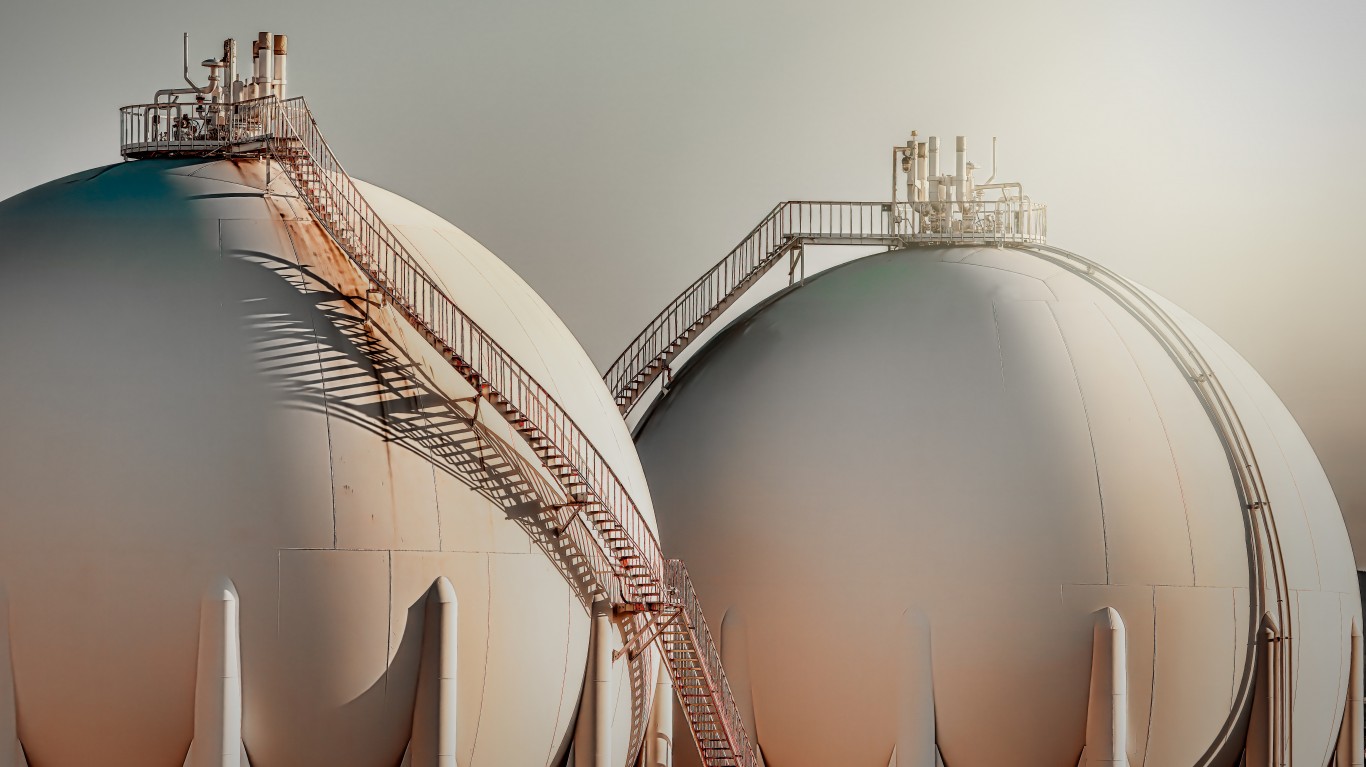
The dividend yield of a stock is the ratio of the share price and the dividend paid over the past twelve months. In general, stocks with high dividend yields are perceived to be safer than stocks with low dividend yields. Along with providing consistent income, such stocks in defensive sectors could prove less volatile even during economic downturns.
Also, companies with high dividend yields usually have substantial amounts of cash, and thus, are considered to have good long-term prospects. Let’s take a look at the 10 biggest energy companies with very high dividend yields.
10 Biggest Energy Companies With Very High Dividend Yields
We have only considered energy companies with a dividend yield of over 10% for our list of the 10 biggest energy companies with very high dividend yields. We have ranked the 10 biggest energy companies with very high dividend yields based on their market capitalization (as of March 30, 2023). Here are the 10 biggest energy companies with very high dividend yields:
10. NuSTAR Energy
Founded in 1999, NuStar Energy L.P. (NYSE:NS) deals in the transportation of petroleum products and anhydrous ammonia, as well as in the storage and marketing of petroleum products. Its shares are down by over 2% year-to-date, bringing its one-year return to almost 9%.
As of this writing, NuSTAR Energy shares are trading at above $15.60 with a 52-week range of $12.80 to $17.75, giving the company a market capitalization of more than $1.7 billion.
9. Equitrans Midstream
Founded in 2018, Equitrans Midstream Corp (NYSE:ETRN) offers midstream services. Its shares are down by almost 19% year-to-date, bringing its one-year return to almost -38%.
As of this writing, Equitrans Midstream shares are trading at above $5.50 with a 52-week range of $5.07 to $9.90, giving the company a market capitalization of more than $2.3 billion.
8. Alliance Resource Partners
Founded in 1971, Alliance Resource Partners, L.P. (NASDAQ:ARLP) is a natural resource company that produces and markets coal. Its shares are down by almost 1% year-to-date, bringing its one-year return to almost 32%.
As of this writing, Alliance Resource Partners shares are trading at above $20.40 with a 52-week range of $14.54 to $27.63, giving the company a market capitalization of more than $2.5 billion.
7. Crestwood Equity Partners
Founded in 2010, Crestwood Equity Partners LP (NYSE:CEQP) deals in the investment and management of energy midstream assets. Its shares are down by almost 6% year-to-date, bringing its one-year return to almost -18%.
As of this writing, Crestwood Equity Partners shares are trading at above $24.50 with a 52-week range of $22.11 to $32.96, giving the company a market capitalization of more than $2.5 billion.
6. Black Stone Minerals
Founded in 1876, Black Stone Minerals LP (NYSE:BSM) deals in the exploration of oil and natural gas minerals. Its shares are down by over 8% year-to-date, bringing its one-year return to almost 14%.
As of this writing, Black Stone Minerals shares are trading at above $15.40 with a 52-week range of $12.81 to $20.24, giving the company a market capitalization of more than $3.2 billion.
5. Sitio Royalties
Founded in 2016, Sitio Royalties Corp (NYSE:STR) invests in oil and gas mineral and royalty properties. Its shares are down by over 22% year-to-date, bringing its one-year return to almost -18%.
As of this writing, Sitio Royalties shares are trading at above $21.70 with a 52-week range of $19.31 to $33.65, giving the company a market capitalization of more than $3.3 billion.
4. Chesapeake Energy
Founded in 1989, Chesapeake Energy (NASDAQ:CHK) deals in oil, natural gas and natural gas liquids. Its shares are down by almost 21% year-to-date, bringing its one-year return to almost -17%.
As of this writing, Chesapeake Energy shares are trading above $75 with a 52-week range of $69.68 to $107.31, giving the company a market capitalization of more than $10.1 billion.
3. Coterra Energy
Founded in 1989, Coterra Energy Inc (NYSE:CTRA) is a diversified energy company. Its shares are down by over 2% year-to-date, bringing its one-year return to around -11%.
As of this writing, Coterra Energy shares are trading at above $24.05 with a 52-week range of $22.25 to $36.55, giving the company a market capitalization of more than $18.5 billion.
2. Devon Energy
Founded in 1971, Devon Energy Corp (NYSE:DVN) is an oil and natural gas exploration, development, and production company. Its shares are down by almost 19% year-to-date, bringing its one-year return to around -17%.
As of this writing, Devon Energy shares are trading at above $49.50 with a 52-week range of $44.03 to $79.40, giving the company a market capitalization of more than $32.5 billion.
1. Pioneer Natural Resources
Founded in 1997, Pioneer Natural Resources Co (NYSE:PXD) is an independent oil and gas exploration and production company. Its shares are down by almost 12% year-to-date, bringing its one-year return to around -20%.
As of this writing, Pioneer Natural Resources shares are trading above $201 with a 52-week range of $177.27 to $288.46, giving the company a market capitalization of more than $47.5 billion.
This article originally appeared on ValueWalk
Take Charge of Your Retirement In Just A Few Minutes (Sponsor)
Retirement planning doesn’t have to feel overwhelming. The key is finding expert guidance—and SmartAsset’s simple quiz makes it easier than ever for you to connect with a vetted financial advisor.
Here’s how it works:
- Answer a Few Simple Questions. Tell us a bit about your goals and preferences—it only takes a few minutes!
- Get Matched with Vetted Advisors Our smart tool matches you with up to three pre-screened, vetted advisors who serve your area and are held to a fiduciary standard to act in your best interests. Click here to begin
- Choose Your Fit Review their profiles, schedule an introductory call (or meet in person), and select the advisor who feel is right for you.
Why wait? Start building the retirement you’ve always dreamed of. Click here to get started today!
Thank you for reading! Have some feedback for us?
Contact the 24/7 Wall St. editorial team.





